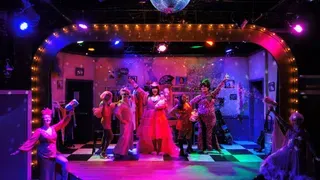November 12, 2008
Made In Poland
Joseph Pisano READ TIME: 2 MIN.
It has been almost twenty years since Solidarity, communist Poland's first independent trade union, spurred a revolution that led to the country's democratic break from the Soviet Bloc. Political and economic reforms soon followed, transforming Poland from a communist society marked by pervasive poverty to a free market society marked by pervasive poverty coupled with widening economic inequality.
Unsurprisingly, Poland's horrendous experience of liberal democracy has left many Poles feeling betrayed. As evidenced by his penchant for smashing expensive cars and the obscenity tattooed on his forehead, Bogus (a strikingly intense Kit Williamson), the angry young man at the center of Przemyslaw Wojcieszek's searing Made in Poland, certainly fits this description.
While Bogus sees himself as a revolutionary, the surrounding community dismisses him as a mindless hooligan. Obviously, if Bogus could articulate a set of organizing principles or even just give a reason for his anger, he might gain some credibility; however, whenever Bogus is questioned about his abnormal appearance and destructive behavior, his standard and pithy response is, "I'm pissed off!"
Conceivably, Bogus has two mentors who could channel his rebellious instincts, but both belong to institutions that no longer garner much popular support in Poland. The first potential mentor, Father Edmund (Ed Vassallo), is a soft-spoken Catholic priest with an unshakable faith in God, while the second, Viktor (the astonishingly talented Rob Campbell), is Bogus's ex-teacher, a drunk with obvious Communist sympathies. Although seemingly well-intentioned, neither man has much to say about the real world anymore.
As Bogus struggles for guidance, three aspiring gangsters (well played by Jayce Bartok, Ryan O'Nan, and Eva Kaminsky) are pursuing him for smashing their Lincoln Town Car. Bogus is eventually faced with the stark choice of reimbursing them 20,000 zloty or dying.
Despite its bludgeoning pessimism, Wojcieszek's "Made in Poland" offers a bit of hope, though, like many East European playwrights, Wojcieszek is an absurdist, so the hope he finds - namely, Krzysztof Krawczyk - is decidedly unconventional. In the play, Krawczyk, an actual Polish pop singer, mostly known for his upbeat disco-infused crooning, becomes Poland's potential savior. For Americans unfamiliar with Krawczyk, in terms of singing style, he roughly translates to Barry Manilow.
Wojcieszek does not turn Krawczyk into a politician; rather, in celebration of the just-feel-good escapism that Krawczyk represents, Wojcieszek elevates Krawczyk to patron saint status. Wojcieszek then refashions Krawczyk's sentimentality into a new revolutionary imperative, using his play's ending to suggest that finding someone to love is the only fundamental change worth pursuing. Given Poland's troubled history, maybe Wojcieszek is not such an absurdist after all.







